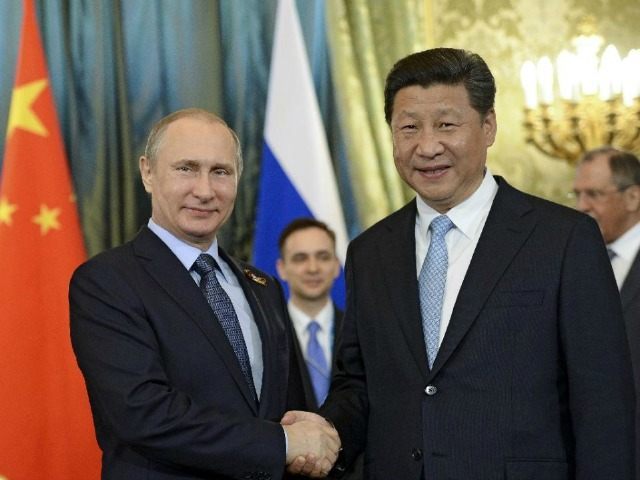The fallout from Philippine President Rodrigo Duterte’s very public insults towards President Barack Obama continues. Russia, previously silent on China’s creeping invasion of Philippine territory in the South China Sea, has now issued a statement supporting Beijing.
President Vladimir Putin himself issued the remarks, telling reporters during this week’s Association of Southeast Asian Nations (ASEAN) summit that he believes China is correct to ignore a decision by the Permanent Court of Arbitration at the Hague that its claims against the Philippines in the region are unfounded.
“We stand in solidarity and support of China’s position on this issue – not to recognize the decision of this court,” Putin said, calling his stance “purely legal.” “It lies in the fact that any arbitration proceedings should be initiated by the disputing parties, while the arbitration court should hear the arguments and positions of the disputing parties. As you know, China did not address the Hague arbitration and no one listened to its position there. How can you recognize these decisions as fair?” he asked.
Putin went on to emphasize that, while “Chairman Xi Jinping and I have developed very trusting, I would say friendly, relations,” Xi never “approached me requesting to somehow comment, somehow intervene in the matter” and his decision to speak out was made unilaterally.
The Chinese Foreign Ministry issued a statement Thursday thanking Putin for his support. “President Putin’s position shows Russia to be objective and fair, and represents the voices of justice from the international community,” spokesperson Hua Chunying told reporters at her daily briefing.
Russia weighing in on the South China Sea dispute represents a major diplomatic victory for China. China claims territory belonging to the Philippines, Vietnam, Malaysia, Brunei, Taiwan, and Indonesia, and its claims are widely rejected by the international community.
The illegal construction of artificial islands on reefs in the Spratly and Paracel Islands — Philippine and Vietnamese territory — are widely considered a violation of the United Nations Convention on the Law of the Sea (UNCLOS).
Despite the vast international rejection of China’s claims, Beijing still managed to form a coalition of allies making public statements in solidarity with China. Unfortunately, none had any stake in the South China Sea, and most were impoverished nations who need Chinese investment to stay afloat: nations like Zimbabwe, Cameroon, Zambia, Afghanistan, Pakistan, Malawi, and Ethiopia.
The ASEAN members, many of them victims of Chinese aggression in the region, did little to condemn China’s military moves in the South China Sea. “We remain seriously concerned over recent and ongoing developments… [the summit] took note of the concerns expressed by some leaders on the land reclamations and escalation of activities in the area, which have eroded trust and confidence, increased tensions and may undermine peace, security and stability in the region,” a joint ASEAN statement read, without elaborating.
The United States has supported the use of the Hague court and repeatedly requested China stop usurping the territory of its neighbors. During this week’s ASEAN summit, however, President Obama’s support, particularly for the Philippines, was noted. President Obama told reporters the Hague ruling was “binding” and emphasized the importance of “respecting international law, not militarizing disputed areas and not occupying uninhabited islands, reefs and shoals.” The relationship between the U.S. and the Philippines was in the spotlight this week after President Duterte’s threat to Obama: “son of a whore [putang ina], I will swear at you.”
Shortly after Duterte’s insult made international headlines, China began flooding the Philippines’s Scarborough Shoal with coast guard ships. On Wednesday, the Philippine government warned that they have evidence China is attempting to turn the shoal into another artificial island, which would expand its potential military presence in Philippine sovereign territory significantly.
“We have reason to believe that their presence is a precursor to building activities on the shoal,” Philippine defense spokesman Arsenio Andolong said. “We are continuing our surveillance and monitoring of their presence and activities, which are disturbing.”

COMMENTS
Please let us know if you're having issues with commenting.